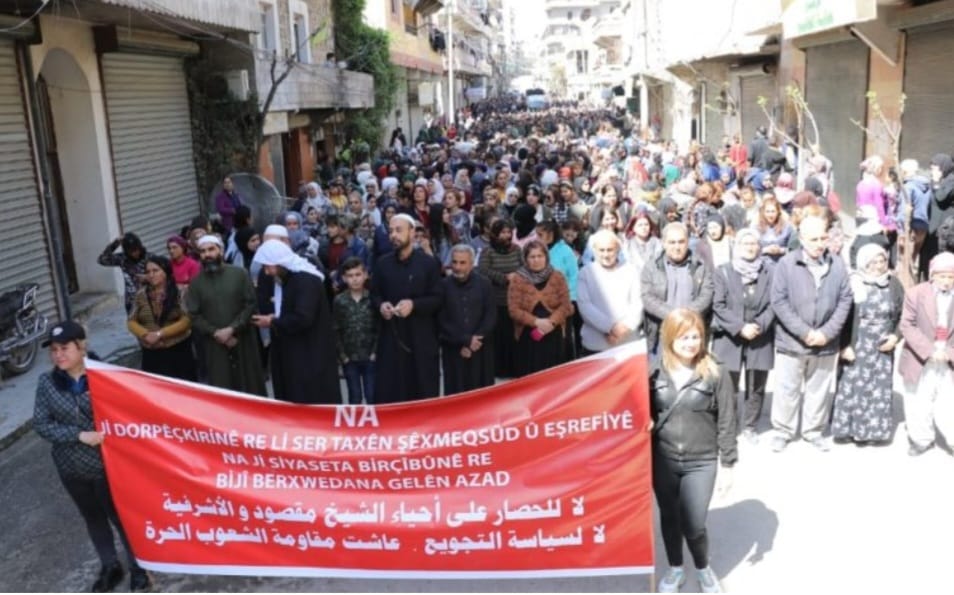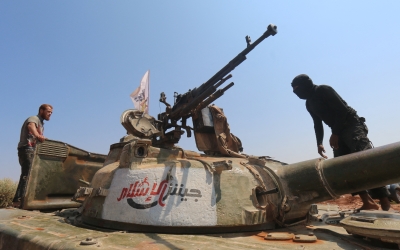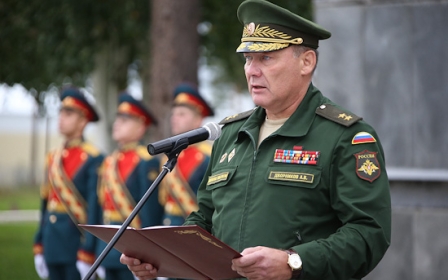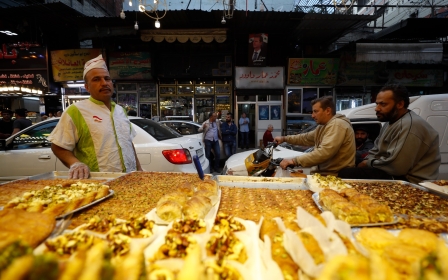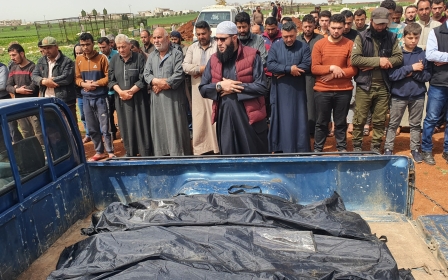Syria: Kurdish-led forces raid government bakery in response to food blockade in Aleppo
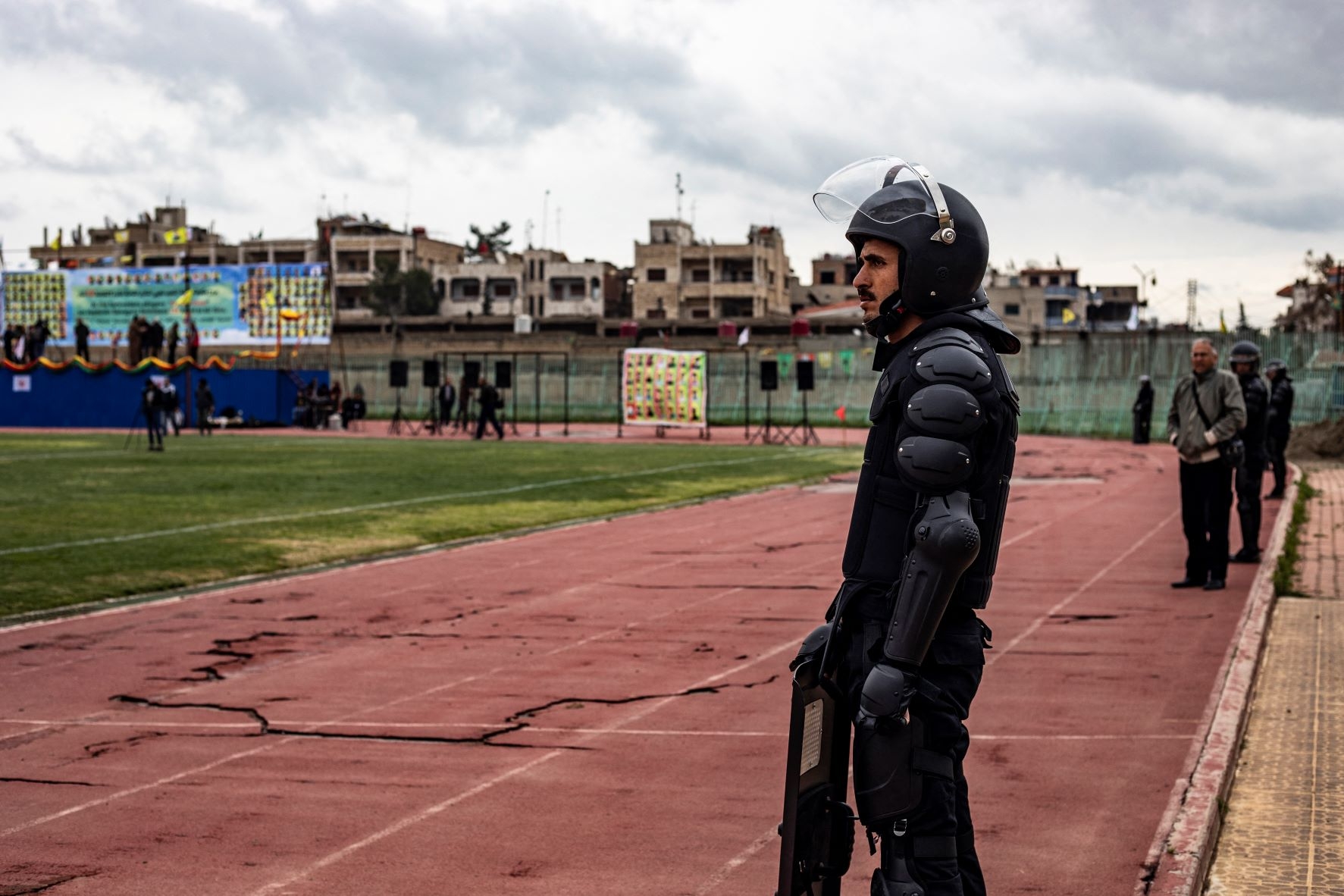
Kurdish-controlled neighbourhoods in the Syrian city of Aleppo are facing starvation after a weeks-long blockade by government forces that has prevented basic food items from entering the districts.
The checkpoints of the 4th Armoured Division of the Syrian army imposed the blockade on flour and other basic goods on the neighbourhoods of Sheikh Maqsoud and Ashrafieh on 13 March.
The move was an apparent attempt by the government to apply pressure on the Kurdish-led People's Protection Units (YPG) which, as part of the US-backed Syrian Democratic Forces (SDF), control much of northeastern Syria in addition to the Aleppo neighbourhoods.
New MEE newsletter: Jerusalem Dispatch
Sign up to get the latest insights and analysis on Israel-Palestine, alongside Turkey Unpacked and other MEE newsletters
On Saturday, YPG-linked security forces in the cities of Qamishli and Hasakeh announced they had blockaded a number of government-controlled centres in retaliation for the government's actions.
"We are pushing the regime in Hasakah and Qamishlo," said a security source in northeast Syria speaking to Middle East Eye on the condition of anonymity.
"Asayish forces [or Kurdish Internal Security Police Force] have controlled the Al-Baath bakery, which is affiliated to the regime," he said, referring to the local security services.
Another source in Hasakah said the Asayish prevented cars from entering the government-controlled region square in Hasakah, though civilians could still enter.
Pictures on social media appeared to show demonstrators in Aleppo on Saturday protesting against the food blockade.
Protesters held banners reading "No to the siege of Sheikh Maqsoud and Ashrafieh neighbourhoods," "no to the starvation policy," and "long live the resistance of free people".
Contested control
The tensions between the government and Kurdish-led forces has highlighted the extent to which much of Syria remains divided, despite President Bashar al-Assad successfully recapturing much of the country, with control often varying from neighbourhood to neighbourhood within cities.
Akram Hamo, a Europe-based activist originally from northwestern Syria, said the ultimate goal of the Syrian government was to pressure the Kurds to hand over the Aleppo neighbourhoods, which have been under YPG control since 2012, to the Syrian government.
"I had contact today with Sheikh Maqsoud, and the situation has not changed, the checkpoints do not allow flour and food to reach the neighbourhood, and today there were protests in front of the checkpoint," he told MEE.
In the past, flour flowed from Kurdish-controlled northeast Syria to the Aleppo neighbourhoods, or the Kurdish-led local council bought bread on the black market. As a result, civilians in the areas were able to buy bread for a lower price.
But, according to sources from Sheikh Maqsoud, since 13 March flour stocks have been almost empty and prices have tripled. Those attempting to buy food from other neighbourhoods risked arrest by government security forces.
Nawaf Xelil, director of the Center for Kurdish Studies, told MEE that the Syrian government wanted to turn back the clock to before the beginning of the Syrian uprisings in 2011, and opposed the alliance between the US and the YPG against the Islamic State group.
"The regime still refuses to recognise the rights of Kurds in Syria and looks down on them," he said.
Xelil said the Syrian government was imposing blockades on the Syrian Kurds amidst news reports that the US might relieve sanctions on northeast Syria.
"The Syrian regime is also threatening to impose its own sanctions on Kurdish areas in northeast Syria," he said.
However, this was not something new, he said, since the Syrian government in the past had also prevented goods from reaching Kurdish-controlled areas in Aleppo, Tabqa, and Manbij.
"The regime is pressuring northeast Syria, so that it could also benefit from the removal of sanctions on northeast Syria."
Nicholas Heras, deputy director of the Human Security Unit at the Newlines Institute for Strategy and Policy, told MEE that "the Kurdish areas in Aleppo are a challenge to the government's complete consolidation of power in Syria's second most strategic city".
"The Syrian government views the Kurdish areas of Aleppo as a potential staging ground for the US-backed SDF, and placing blockades on these areas is a tool for Assad to pressure the SDF."
Middle East Eye delivers independent and unrivalled coverage and analysis of the Middle East, North Africa and beyond. To learn more about republishing this content and the associated fees, please fill out this form. More about MEE can be found here.


